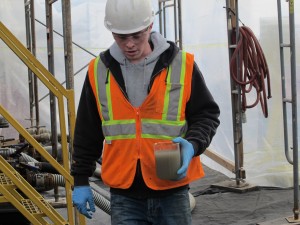Study: Treated fracking wastewater could still threaten drinking water
-
Susan Phillips

Susan Phillips / StateImpact Pennsylvania
A worker collects a water sample at a natural gas wastewater recycling plant in Susquehanna County. At this facility, the wastewater reused in oil and gas drilling, and the solids that contain salts are sent to a landfill.
A new study shows how treated wastewater from oil and gas operations, when discharged into rivers and streams that travel toward drinking water intakes, can produce dangerous toxins. The research confirms what scientists have been warning about for some time. The high concentrations of salty brine, which flows up from deep underground once a well is fracked, are difficult to remove from the wastewater without the aid of an expensive technique called reverse osmosis or a cheaper method known as thermal distillation. If the wastewater is treated conventionally, which does not remove the bromides, chlorides or iodides, then it can be combined with chlorine at a drinking water facility, and create carcinogens such as bromines and iodines.
The peer-reviewed research was published this week in the journal Environmental Science & Technology, and conducted by a team from both Duke University and Stanford University. Researchers from Duke University, who recently published a study on the impact of faulty well casings, had water samples from Pennsylvania and Arkansas frack sites, which they shared with the Stanford researchers. In the lab the researchers diluted the fracking wastewater with water samples from the Allegheny and Ohio rivers. What they found was that just .01 percent per volume of fracking wastewater, when combined with the disinfectant chlorine used by drinking water facilities, created trihalomethanes. The EPA limits the amount of these compounds in drinking water because of their link to kidney, liver and bladder cancer.
The low level of dilution that created the toxic compounds surprised the researchers. “The drinking water facilities should be aware of this,” said Bill Mitch, a lead researcher on the study and an associate professor of civil and environmental engineering at Stanford University. “You need a lot of dilution to make these discharges no longer matter.”
In 2011 the Department of Environmental Protection asked Marcellus Shale drillers to voluntarily stop sending their wastewater to conventional treatment facilities. The industry group, the Marcellus Shale Coalition pledged to stop. It’s unclear whether or not all of them are still complying with that request. The Department of Environmental Protection did not respond to our questions. But Mitch says that even if all of the Marcellus Shale drillers have stopped using these facilities, wastewater from the smaller, conventional drillers could still have the same impact.
















